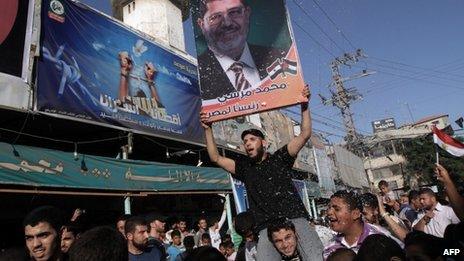Egypt's neighbours watch rise of Muslim Brotherhood's Morsi
- Published

Egypt's neighbours may well be wondering what changes the new presidency may mean for the country's foreign policy.
For the timebeing, they need not worry - foreign policy remains firmly in the hands of the ruling military council, Scaf.
The contours of Egypt's new political system may not emerge before the end of the year. Even then, the new government will still be very busy putting its own house in order.
The Muslim Brotherhood are shrewd pragmatists and they are fully aware that Egypt has enough internal problems of its own.
So it is unlikely there will be any noticeable change to its foreign relations for some time to come, unless forced by some unforeseen conflict - which cannot be ruled out given the level of volatility in the region.
Israeli concern
But from the moment Hosni Mubarak was overthrown many of Egypt's neighbours have watched with varying degrees of alarm the Muslim Brothers' rise to power.
For the Israelis in particular an Islamist in the presidential palace in Cairo is their worst nightmare.
The Muslim Brotherhood - the organisation of which president-elect Mohammed Morsi was a member throughout his adult life before resigning in order to assume the presidency - has made no secret of its hatred of Israel.
Like all other Islamists and even many secular nationalists for that matter, the Muslim Brotherhood has been vehemently opposed to Egypt's peace with Israel, only reluctantly growing to accept it out of sheer pragmatic self-interest.
Without that, it would have been near impossible for the ruling military generals to have allowed them anywhere near the seat of government.
It is also known that they have reassured the Americans - who brokered the Camp David Accords between Israel and Egypt more than 30 years ago - that they would abide by the deal.
But will Mr Morsi or any member of his Islamist Justice and Freedom party ever shake hands with an Israeli?
I put this question to the Muslim Brotherhood's spokesman in Cairo. After baulking at the mere question, he suggested that any future Islamist-led government would have to appoint a foreign minister who is not from the party.
The official Israeli response to the election of Mohammed Morsi has been measured and diplomatic. But Israel must be watching him closely, and especially whom he selects as foreign minister.
The Palestinian faction in control of the Gaza Strip, Hamas - which is in fact an offshoot of the Egyptian Muslim Brotherhood - has high hopes. But it will soon be disappointed, as Mr Morsi will have other pressing domestic priorities.
Migrant communities
Watching closely are also Egypt's powerful rich neighbours to the east, the Gulf monarchs, for whom the removal of Mr Mubarak - a close friend and ally - was a personal loss, even a psychological trauma when he was finally put on trial and eventually given a life sentence.
This is not the way the tribal societies of the Gulf treat their chiefs.
Paradoxically though, the conservative Gulf rulers have a lot in common with the Muslim Brotherhood's socially conservative outlook - especially when it comes to female dress code, the status of women and personal freedoms.
But they are profoundly wary of the kind of religious activism espoused by the Muslim Brothers, which has been key to their electoral success.
There have been reports of authorities in the Gulf States becoming increasingly alert to what the vast Egyptian migrant communities are up to, fearing that the revolutionary "epidemic" might spread to their societies.
The UAE in particular was reported to have adopted a more restrictive policy regarding work permits for Egyptian nationals.
That fear and suspicion of "trouble-making Egyptians" is unlikely to go away any time soon as the Islamist ascendency and revolutionary politics in Egypt continue unabated.
Syria policy
However, an Islamist Egypt - if that ever becomes a full blown reality - will most likely avoid upsetting the Gulf rulers.
It will need their investment in the cash-starved Egyptian economy; and it wants their labour markets to stay open for the millions of young Egyptians seeking work they cannot find at home.
So, the four main areas that formed the cornerstone of Egypt's relations with the outside world during the Mubarak years - strong ties with the West and the conservative Gulf monarchs, peace with Israel (albeit a cold one), and containing Iran's regional ambitions - are set to remain unchanged for the near future at least.
But one area where they might seek change is Egypt's policy towards the carnage in Syria. The ruling military council and the two governments it has appointed over the past year-and-a-half have been conspicuously silent on the civil war there.
Here, Mr Morsi and his new government will most likely push for a change and even possibly explicit support of the rebels, especially given that such a policy would not put Egypt on a collision course with either the West nor with Gulf monarchs, who openly support the insurgency against the Assad rule.